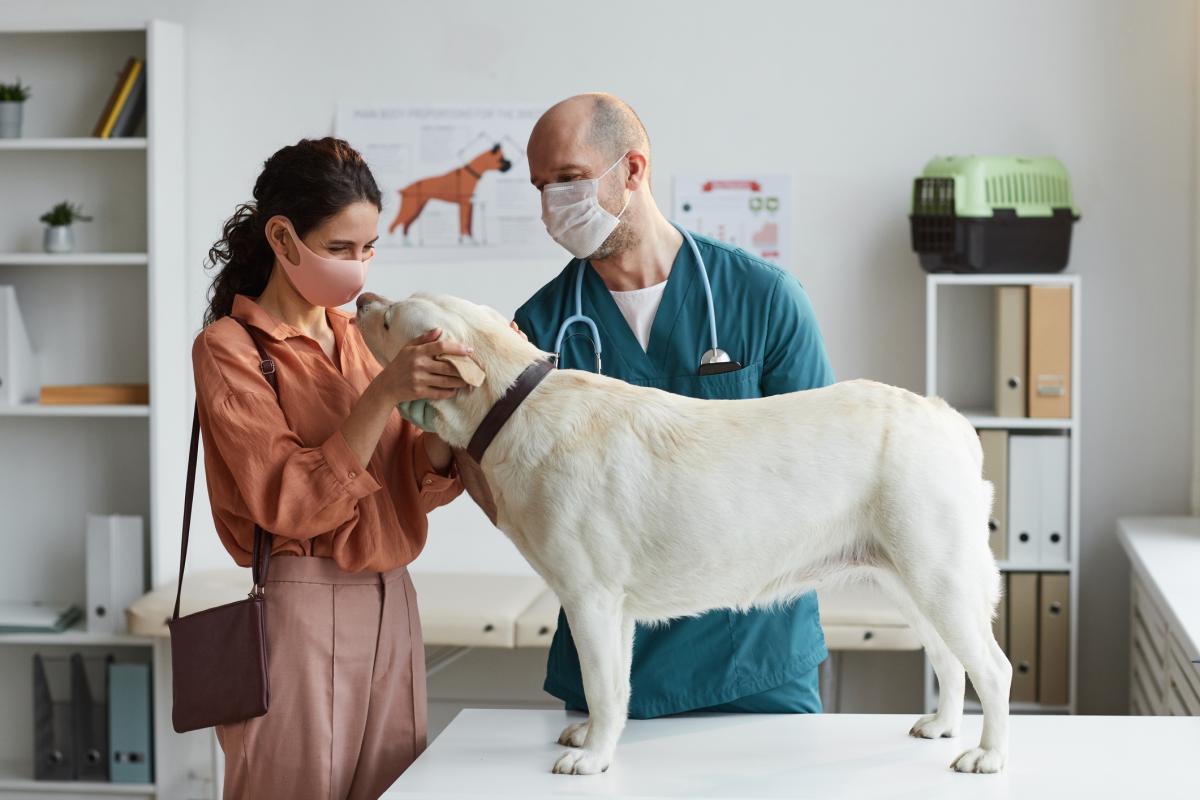How to get the most out of your relationship with your veterinarian
How well you and your veterinarian communicate with each other has a huge impact on how you feel about the care your pet receives. That’s because the better your rapport, the more confidence you’ll have in decisions about treatment or care.

A growing body of research from the Ontario Veterinary College (OVC) aims to understand what makes for a successful veterinary-client relationship. For postdoctoral researcher Natasha Janke, who recently completed her PhD in Epidemiology at OVC, good relationships begin with successful information exchange at the clinic or at virtual appointments.
“A lot of information gets exchanged during veterinary visits, and it’s important we understand what works well, and what contributes to less ideal interactions,” says Janke.
Pet owners are the keepers of important information about their personal lifestyle, home environment and any changes they may have noticed in their pets. Is there a smoker in the house? Has there been a change in who lives there? These details may not always be top-of-mind for pet owners, but they are important factors that may influence a pet’s behaviour or health.
“Pet owners who come prepared to share information about their pet, lifestyle, and home environment can contribute to the veterinarian-client relationship that many pet owners are looking for,” says Janke.
DECISIONS, DECISIONS
 Through surveys and focus groups, Janke studied how information is shared in veterinary appointments from beginning to end.
Through surveys and focus groups, Janke studied how information is shared in veterinary appointments from beginning to end.
“Clients expressed a strong expectation to work in partnership with their veterinarian, and to combine their knowledge of their pet with the medical knowledge that the veterinarian has, so they could decide together how to best manage their pets’ health,” says Janke.
But before a client can become part of the decision-making partnership, participants in Janke’s client focus groups expressed wanting veterinarians to develop an understanding of the client’s information needs. Veterinary clinics typically have a variety of tools, including visual aids and other resources, allowing for a tailored approach to client education.
UNDERSTAND YOUR OPTIONS
There is a growing recognition among veterinarians that clients prefer to be offered options when making decisions, rather than a single path forward.
Janke says the pet owners she consulted in her study reinforced this idea. Participating pet owners perceived their veterinarians to have financial motivations when a single recommendation was made. For example, if weight loss is a desired outcome for a pet, pet owners indicated that speaking in general terms about the benefits of different nutritional options is better received than recommending a single brand. Pet owners can foster a shared approach to decision-making by asking ‘What options are available?’.
WHAT IF YOU GOOGLED?
 If you’ve been searching for pet health information online, is it appropriate to discuss it with your veterinarian at your appointment? Absolutely, says Nanette Lai, a PhD student in Epidemiology at OVC who studied how online searches may impact a client’s relationship with their veterinarian.
If you’ve been searching for pet health information online, is it appropriate to discuss it with your veterinarian at your appointment? Absolutely, says Nanette Lai, a PhD student in Epidemiology at OVC who studied how online searches may impact a client’s relationship with their veterinarian.
“Veterinarians shouldn’t feel surprised that clients are searching online, and clients should feel comfortable sharing what they’ve read, and asking what their veterinarian thinks about what owners have found,” says Lai. “Your veterinarian can help you understand what information is credible, and when necessary, they can direct you to trustworthy online sources.”
Lai says in many cases, pet owners have already consulted online resources before making an appointment, to help them decide if a visit was warranted.
“For example, a pet owner might start with a search such as ‘is cat vomiting normal,’” Lai says.
“They will probably find results that suggest the owner consider the frequency, period of time, and other factors that would indicate if the situation is more or less urgent.”
Lai says her research shows pet owners relied on information from search engines, social media and even breed-specific online forums. In general pet owners suggested they were supplementing information, but they expressed a preference to get information directly from their veterinarian. She notes some pet owners may choose not to disclose their online searches because they felt it may be perceived that they were second-guessing their veterinarian.
“Our study showed that searching for pet health information online doesn’t displace veterinarians’ guidance,” says Lai. “Most people reported the veterinarian-owner relationship was stronger when online searches were openly discussed.”
WHAT IF YOU HAVE A LOT OF QUESTIONS?
Access to veterinary care is harder to come by since the COVID-19 pandemic. So how do pet owners get information they need without monopolizing their veterinarian’s time?
“If you need additional information or wonder if an appointment is warranted, contacting your regular clinic through their website or phone is a great first step,” says Janke. She notes that many clinics post trusted resources on their websites, and most will provide links by client request.
To make the most of your appointment time, pre-pare the same way you would for your own medical appointment – and find out the best way to follow up if you have more questions after you leave.
“Some pet owners want only basic information, and others need more detail before they feel comfortable with making decisions about their pet’s care,” says Janke. “If you need your veterinarian to take a different approach with you, it’s best to tell them.”
Natasha Janke completed her research with Dr. Jason Coe, professor and the VCA Canada Chair in Relationship-Centred Veterinary Medicine. Nanette Lai is a PhD student in Dr. Deep Khosa’s Lab. Khosa is an associate professor and academic coordinator of the Hill’s Pet Nutrition Primary Healthcare Centre.
This story originally appeared in the spring / summer 2022 issue of OVC Pet Trust's Best Friends Magazine. Join our community and subscribe to the pet magazine of the Ontario Veterinary College.

